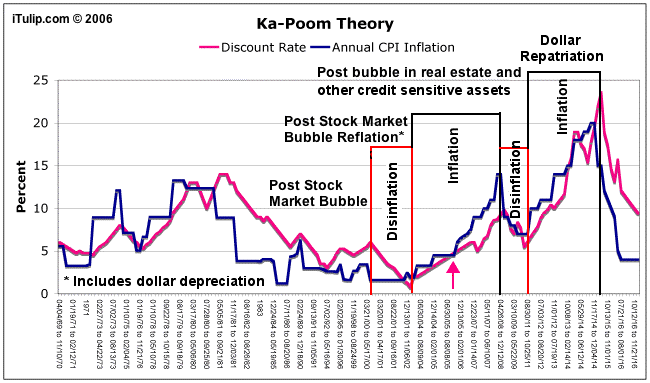Re: The Face of Inflation: Does the U.S. Have a "Peso Problem" revisited
Being a financial neophyte, I derive a large part of my thinking from a mix of sources. EJ predicts a discount rate above 20% for about a year period.
So, to answer your question about what will happen . . . what he said.
But I don't see what you're getting at with this question. Can you please say what you think will happen and why it will scuttle my plan?
It is precisely the reaping that will enable me to make a profit. If there is no reaping, my plan won't work.
In other words, high inflation, high interest rates, big spread, big profit.
Perhaps I need to explain again . . . .
I buy short term T-bills (either 3- or 6-month), which are then continuously reinvested. When interest rates reach a high level, I either sell the T-bills or let them mature. Then, I take the money and purchase a 30-year bond locking in a a high rate.
At what point am I doing "both at once"?
The two financial instruments involved in my proposal are the equity loan and Treasury securities, both of which I have examined and have some familiarity with. Since I found no great risk in what I am proposing, I was hoping someone with more experience would be able to point out something I had missed.
That's a relief. I thought I had to do what EJ said 
if interest rates hit 20% - something which hasn'nt occured ever in the United States as far as I know, do you really think nothing will have happened to justify this?

So, to answer your question about what will happen . . . what he said.
But I don't see what you're getting at with this question. Can you please say what you think will happen and why it will scuttle my plan?
Certainly the USA is not Zimbabwe, but then again it is equally foolish to think that the USA is somehow immune to reaping the rewards of its actions.
In other words, high inflation, high interest rates, big spread, big profit.
As for your reaping interest - you don't get to both renew and lock in a rate. You can do 1 year Tbills, or you can lock in a rate with a long bond, but you cannot do both at once.
I buy short term T-bills (either 3- or 6-month), which are then continuously reinvested. When interest rates reach a high level, I either sell the T-bills or let them mature. Then, I take the money and purchase a 30-year bond locking in a a high rate.
At what point am I doing "both at once"?
what I am suggesting is to look to existing financial instruments based on the actions you are proposing to understand what risk you are taking on.
Ultimately it is your money, do with it what you will 


Comment